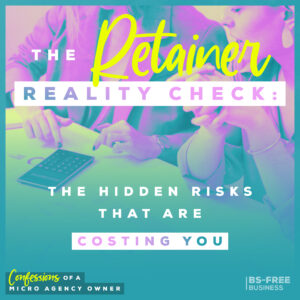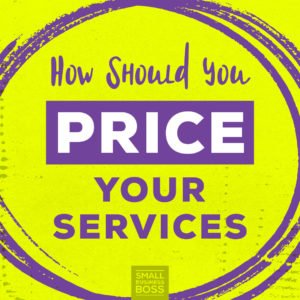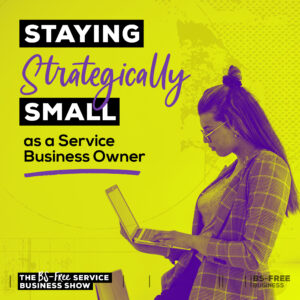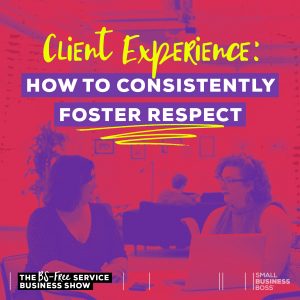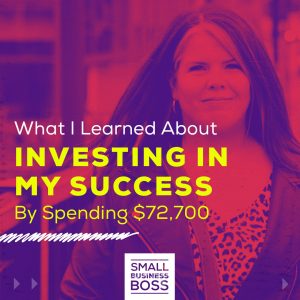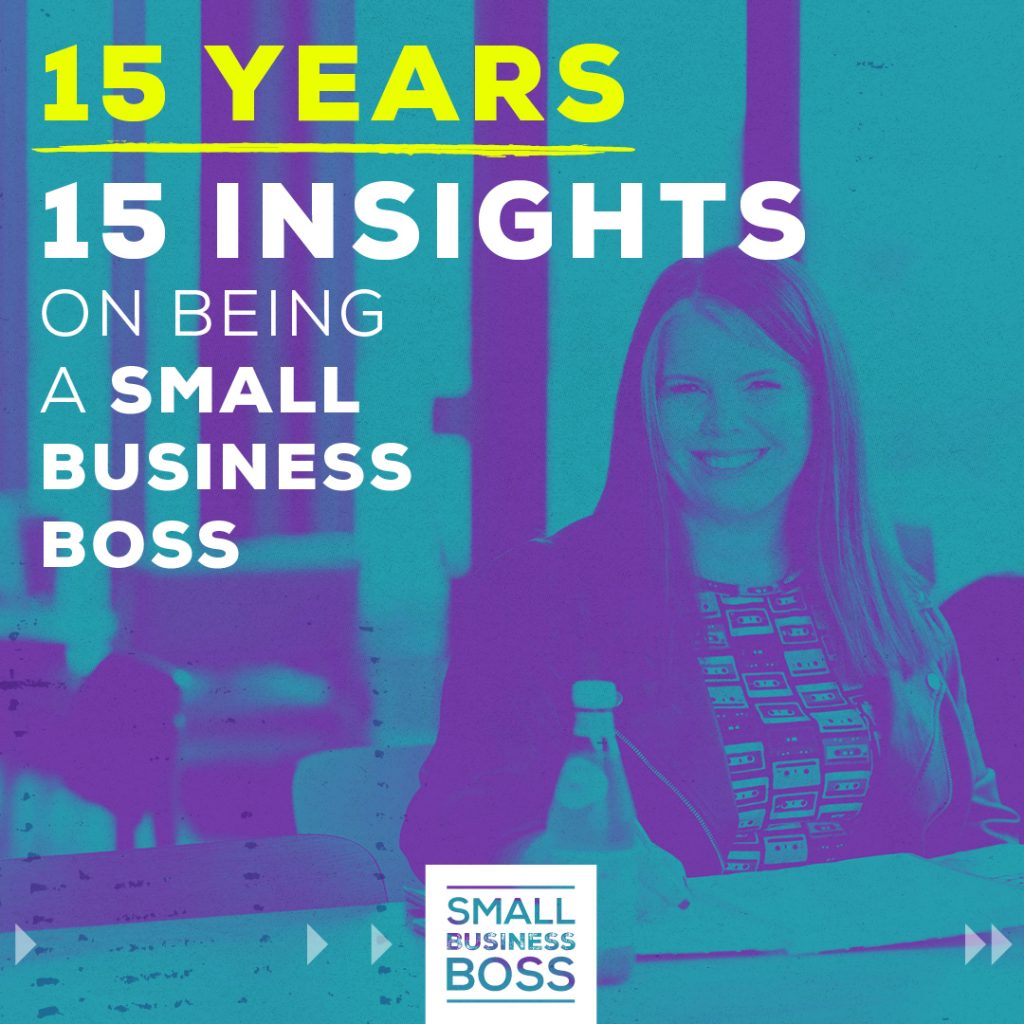
Search the site:
15 Years, 15 Insights on Being a Small Business Boss
Today, you’re helping me celebrate a milestone in my business, 15 years of being my own boss. And there’s nothing like an anniversary to make you reflect on how far you’ve come. In this episode, I’m sharing 15 insights from my 15 years of being a small business boss.
Way back in 2005, I quit my job and became my own boss. I was coming off my year-long mat leave, and I knew that if I didn’t give it a shot, I probably wasn’t going to ever do it. So I started my business with a used laptop that I’d bought from my father, some business cards and whole lotta faith.
All these years later, I literally can’t imagine not having made that decision, and without a doubt, it’s one of the best life choices I’ve made. To celebrate, I thought I’d share 15 insights or lessons I’ve learned along the way.
In this episode, I’m sharing eight lessons, and next week, I’ll share seven more.
Table of Contents
#1. Everything Has Changed But Business Fundamentals Remain the Same
When I started my business, digital marketing was brand new. There was no social media, and blogs were something most companies hadn’t yet embraced. To say things have changed would be an understatement.
Despite how my work has changed and my client base has evolved, the fundamentals of running my business are the exact same. That’s the beauty of a service business, it’s deliberately simple and you don’t need anything fancy to be successful. You can STILL start your service business today with a crappy laptop and some business cards and maybe a basic website. Success isn’t about being fancy, it’s about being good at what you do.
#2. Willingness to Evolve is Everything
When I started my business, I was mainly focused on doing PR, mainly media relations for my clients. But as digital marketing emerged, and content marketing became an entire subset of marketing, I was being asked by clients if this was something I could help with. Instead of freaking out and being like “OMG, what am I doing?!?!?”, I took on the challenge.
By being willing to evolve my skill set as trends and my client’s needs shifted, I set on a path to where I am today. By saying yes when I wasn’t sure, but was willing to figure it out, I opened up new opportunities. That scary thing you need to learn next or the client project that makes you uncomfortable may be your next big opportunity.
What made this work for me is that these “new” skills leaned into what I really enjoyed doing, which was writing and creating content. I was ready for a change, and knowing when I need to evolve as a professional has meant my business has been able to grow and thrive over the years.
#3. Just Because You Can, Doesn’t Mean You Should
This has become a mantra for me, because that same interest and thirst to learn new things can get me into trouble. There have been countless times where I’ve found myself involved in specific projects that should have been a hard pass.
Sometimes it was motivated by the challenge, and other times I was driven by money. Every one of these situations all had something in common: I knew damn well I should have said no. Yet, I still did it.
I’ve had to learn how to discern the difference between being resistant to a new client or opportunity (which is my default reaction to anything new) versus my gut telling me “Oh Maggie, oh hell no. Don’t do this.” It’s a subtle distinction, but one I think I’m finally, after 15 years, getting better at.
#4. Clients From Hell Are a Thing
You can do everything right, and clients from hell are going to happen. You can screen people, you can have the best contracts and still people are going to get through. Because we’re people dealing with people, and you can never fully predict how a situation will play out.
If it wouldn’t get me into hot water I could do an entire podcast on all the clients from hell situations I’ve dealt with. It happens, and I want you to know that when it happens to you (because it definitely will), you’re not alone.
One hard truth I’ve had to face is that there’s a clear pattern to my hellish client situations, and a lot of that comes down to specific kind of client. And it’s a big reason why we don’t work with those types of organizations anymore. Understanding that pattern has made for much happier client engagements and way less stress for me and my team.
#5. You’re Not Missing Anything
After getting into the online business world back in 2013, I spent years looking for a magical answer to tell me what I was missing. Only to find out that I am not missing a damn thing.
A big part of this has been realizing that while I value outside input and support, that’s there to help me based on what I already know. It’s not about net new information but helping me shape my perspective and make decisions as a business owner. Because no one is coming to save me. I have to save myself, and that means bossing up and not wasting hours and days of my life chasing answers that don’t exist.
#6. Create More, Consume Less
Many of you who are listening are creatives, and clearly if you listen to this podcast, you’re consuming other people’s content. For many years, I spent a lot of time listening to and reading other people’s content. While some of it was helpful, a lot of it left me confused and in some cases, feeling like crap.
For the last two to three years, I’ve become incredibly particular about who’s content I consume. By consuming less and not letting just anyone into my head, I’m happier, and I’m more creative. I have less garbage and external opinions messing with me.
Unsubscribe. Unfollow. Mute. Do what you need to do to protect your precious creative energy, as that’s worth more than any random piece of advice ever will be.
#7. Life Comes First
We live in a time that glorifies stories of entrepreneurship that involve hustling until the point of collapse. While I’m all for working hard and have the willingness to do what it takes, I’ve also never been willing to work myself to the point of burning out.
I started my business because I wanted to have a simpler life that didn’t involve an early morning daycare drop off and constantly rushing through my day. I wanted the freedom to spend my time on my terms.
And while I no longer have to deal with daycare as the mom of a nearly 16-year-old, the same principles apply. My business is here to support my life, so I do my best to ensure my life comes first.
It’s not perfect, but when I set goals, when I plan for the future, when I choose how I spend my days, I always come back to a commitment to a life that’s well lived. One that’s based on having the freedom to manage my time on my terms and make a great living while doing it.
If you’re not there yet, it is possible. Hustle isn’t a necessary condition. Burnout isn’t a badge of honor as a business owner. You get to choose how you spend your time and how you run your business and life. Not your coach, your clients or anyone else, you’re the sole decision maker, so act like it.
#8. Let Your Faith Be Bigger Than Your Fear
This one feels pretty relevant right now as we wait out the pandemic and we don’t have clear answers about what’s to come. I’m sure this sounds familiar, but there are days in my business where I decide that this may be the end of my business, that I’m finally going to fail.
Fear is a natural part of running a business, and anyone who says they don’t have moments of complete fear is a liar. The key for me has been letting my faith be bigger than my fear. To catalog that faith in the form of my track record, happy client, client wins and more so it’s there to counter the fear when needed. That evidence is everything when the fear starts the ticker tape parade in my head.
Thankfully, those days are few and far between at this point, but they still happen. But my surefire fix to get through those days is to remember that I always land on my feet, and that there’s no reason to think things won’t work out.
#9. It’s Okay to Raise Your Rates
Unless this is the first episode you’ve never heard of the show, you’ve probably heard my story of not raising my rates for the first EIGHT years of my business. That’s right, for the first eight years I charged the same hourly rate!
Then, something finally clicked and I realized that my growth was completely tied to my being willing to raise my rates. Did I start charging $1000 because that’s what I was “worth”. Definitely not. But I did adjust my rates to a point that it was on par with what someone with my skills and experience would charge.
I also realized how much money I probably left on the table over those seven years, but that’s okay. It’s on me, and I learned from it.
Much of the growth we’ve had in 2018 and 2019 can be attributed to two things, (one of which I’ll talk about in a moment), but one factor is pushing the edges of what we charge clients. Instead of sticking with a single rate for years, we’re constantly playing with our pricing to see how we can increase the total value of each client. There are a number of factors that go into those decisions on how to price our services, but the important part is that we’re experimenting and learning from each situation as we go.
A final word on raising your prices. Timing is everything, and you want to be thoughtful about this approach. Our biggest pricing wins come from our new clients, not our existing ones, so carefully consider how, when and why you raise your prices for your current clients. Having been on the receiving end of some seriously ill-timed price increases, your timing is critical to getting a yes and maintaining a strong working relationship.
Next up, the other factor that helped us grow the agency, changing our approach to finding clients.
#10. Stop Being Passive About Finding Clients
I remember a conversation back in 2017 with my then business partner about our approach to finding clients was limiting growth. Yes, we were doing many different things, but most of it was passive.
To that point as a business owner, finding clients “passively” (as in waiting for them to come to us) worked really well. Until it didn’t anymore if we wanted to reach our goals. From that moment on, I switched it up. I tried different tactics, I focused on diversifying our sources of leads as much as possible.
And as I shared back in January, that approach has paid off. You can check out my 2019 recap of how we found clients and the surprising results in a detailed blog post.
If you’re dependent on any one lead source, especially if that’s passive, I encourage you to think about how you can add new tactics to the mix. The more potential lead sources, the more potential clients. And when you have more leads, you have more power over who you work with and how much you charge.
#11. Take the Vacation
This may seem like a ridiculous insight, but it’s worth sharing, because business owners like to think that their businesses will collapse if they take time off.
I call BS. Time away is essential to your well-being, and if you’re not taking regular time out of your business, away from your clients to go have a life, what are you even doing? You don’t have to file a vacation request, so get to it.
I get it. The “I am indispensable” storyline is one we all do really well. I know I fall prey to it, and when I do step out of my business, I’m always so happy I did.
Case in point: Last fall I went on a 10-day trip to Italy and Greece. I was out of touch for days on end (literally, I was on a cruise ship and I’m not paying for their internet) and nothing happened. What needed to get done, got done, and everything that needed me was suspended until I got back.
And over the years, I’ve had the privilege of doing this over and over again. And you don’t have to travel. It doesn’t matter if you’re staying home, taking time off is still important.
Take the vacation. The staycation. Doesn’t matter what you’re doing, just tell your clients you’re taking the week off. Go enjoy it. Don’t worry about work as it will always be there.
#12. The Unexpected WILL Happen
As you can imagine, over 15 years there have been a lot of twists and turns in my journey. A lot of highs and some serious lows.
I’m sure you’re no stranger to the entrepreneurial sob stories that are designed to sell you something. So before I talk about my not-so-awesome moments, I want to be clear, I’m going to sell you nothing! I wanted to share this insight as the unexpected will happen as a business owner. You can’t plan for it, but shit is going to happen that’s beyond your control.
Case in point: May 2018 when I was in the middle of a personal dumpster fire after my father died and my mother was diagnosed with two instances of cancer. It was stressful, intense and I was dealing with anxiety in a way I’d never had before. Then, my business partner exited the business in an unexpected turn of events.
Suddenly my business, my safe place amid the stress circus of my personal life, wasn’t safe anymore. And there were a few moments in there I didn’t think I was going to make it through to the other side business-wise.
But, the reality is we can do hard things. And I feel like in that chapter, I did many, many hard things. Tough decisions. Letting clients go. Rebuilding and pivoting the agency.
And on the other side of that unexpected plot twist, honestly, I think it was one of the best things that’s happened to my business. Don’t get me wrong, I’m still close friends with my ex-partner Brittany and I love her to pieces. But that situation and those hard things opened up the door to different things.
Let’s be real for a second. For many of us, the pandemic is our unexpected thing, as we don’t know what’s going to happen, and it’s an incredibly strange time to be running a business. If you feel like you’re going through hell, as the quote says, keep going. The unexpected happens, but we can choose how we decide to navigate through it.
#13. Capacity is a Bitch
On a lighter note, I want to talk about capacity. Whether that’s your own or your team’s capacity. I included this insight as it’s one of the main questions I get from agency owners, and there’s no clear or perfect answer.
Facts: Capacity is a bitch. It’s a delicate ecosystem that relies on a combination of reliable data and gut instinct. You can have the fancy spreadsheet and all the models in the world, but the decisions and actions we take daily, on a micro level, impact capacity. Your data is inherently flawed, so you’re never going to nail it 100% unless you work in a bubble, which when you work with clients is impossible.
That’s where the gut comes in. You need a plan, but then you need to have the ability to constantly gut check capacity as things shift and change. Every project, every task, every discussion with a client has the impact to shift things.
This is where capacity gets sticky and people tend to become hostile about how things are going. They feel overworked, overextended and wonder how the hell this happened and they blame capacity, when they really should blame their decisions. I mean, I’ve definitely been there.
That’s why my approach has evolved to a combination of capacity planning so I know how many “hours” we need to serve clients for, what our internal commitments are and so on. I have a baseline state of capacity, and then use that to inform my decisions on an ongoing basis with the understanding that it will constantly be shifting.
Maybe that’s not what you want to hear, but if you don’t have a handle on your capacity, start with that baseline. That’s going to reveal a lot of information to help you improve your decision-making skills and shift in real-time so you can avoid getting into situations where you’re overcapacity.
And if you’re drowning and overcapacity. No spreadsheet is going to save you. You need to save yourself. Say no. Push out deadlines. Be realistic about how long things take. That’s how you can dig yourself out of that hole.
#14. You Don’t Have to be an Expert at Everything
We operate our businesses in the era of the expert where expertise is valued above all else. Which is great for us, as it’s what lets us run our businesses in the first place.
But there’s a downside to this. And it’s one I’ve had to learn the hard way over many, many years. You can’t be an expert at everything, and trying to be is going to drive you into the ground.
It’s okay to not have the answer. It’s okay to not know what to do. It’s okay to have to defer to someone else who does.
That doesn’t make you weak. It makes you strong. Staying in your own lane is the mark of a professional who has clear mastery over their chosen field.
If you need certain skills, collaborate with someone who has them. If you need additional support, get it from a pro who specializes in that area. Save yourself the time and stress of trying to learn all the things and be everything to everyone.
You’re an expert at what you do. So stick to that.
#15. Blessings Not Burdens
As an agency owner, and someone who’s constantly worked with contractors and collaborators, I’ve learned that those people can be a blessing or a burden.
Yes, having a team or working with other people requires a whole host of skills, and no one drops into a role and does everything perfectly overnight. But the question I consistently ask myself is “is this person a blessing or a burden?” When I hire, I want someone who makes things better or easier, aka a blessing. Can I objectively look at what they’re doing and see how it’s making things better, or has the potential to.
If not, we’re into burden territory. And as a small, agile agency, beyond a certain point of training and support, I don’t have time for burdens. Not everyone is a fit with our team, and not everyone is going to work out for the long-term, and I’m surprisingly okay with it.
Over the years, I’ve definitely let “burden” situations go far too long, and the loser in that situation was me. Sometimes it was because I liked the person, other times it was because I wanted to be fair. And in other situations I was convinced we couldn’t replace that person.
But the outcome was always the same. They were burdening me and the rest of the team.
The key for me is that I don’t expect perfection, but I watch for how interacting with someone makes me feel. Am I relieved or rolling my eyes? That’s the key difference and tells me if they’re a blessing or a burden.
If your team is making you roll your eyes, look carefully at why. Do they need more training? Is the process unclear? Or are they phoning it in and burdening you and your business? Discerning what you can improve and what’s not changing can make all the difference in how you build your team.
And with that, those are my 15 insights from 15 years of business. I have so many more, but I wanted to pick and choose the ones that would be most broadly applicable and helpful. I’d love to know which one was most relevant to you and your business, so hit me up on Instagram to share with me!
Links for this episode:

I’m Maggie Patterson (she/her), and services businesses are my business.
I have 20+ years of experience with client services, am a consultant for agency owners, creatives, and consultants, and vocal advocate for humane business practices rooted in empathy, respect, and trust.
Read or Listen to the Latest
For Solo Business Owners

Growing a solo service business is tough.
It’s even harder when you’re bombarded with BS advice that steers you away from your values and why you started your business in the first place.
This is the podcast for solo creatives and consultants who want to remain as a team of one and have zero interest in the hustle and grind of typical business teachings.
Subscribe now and never miss an episode.
For Micro Agency Owners
Most podcasts for agency owners obsess over revenue growth as the ultimate success metric.

But here’s the truth: not everyone wants to make millions. Your goal might be to build a sustainable business that lets you have a life and doesn’t run you into the ground.
Join me as I spill my shameless confessions and share everything I’ve learned about building a micro agency that skips the BS of tired and typical agency teachings.
Follow Now on All Major Podcast Platforms
